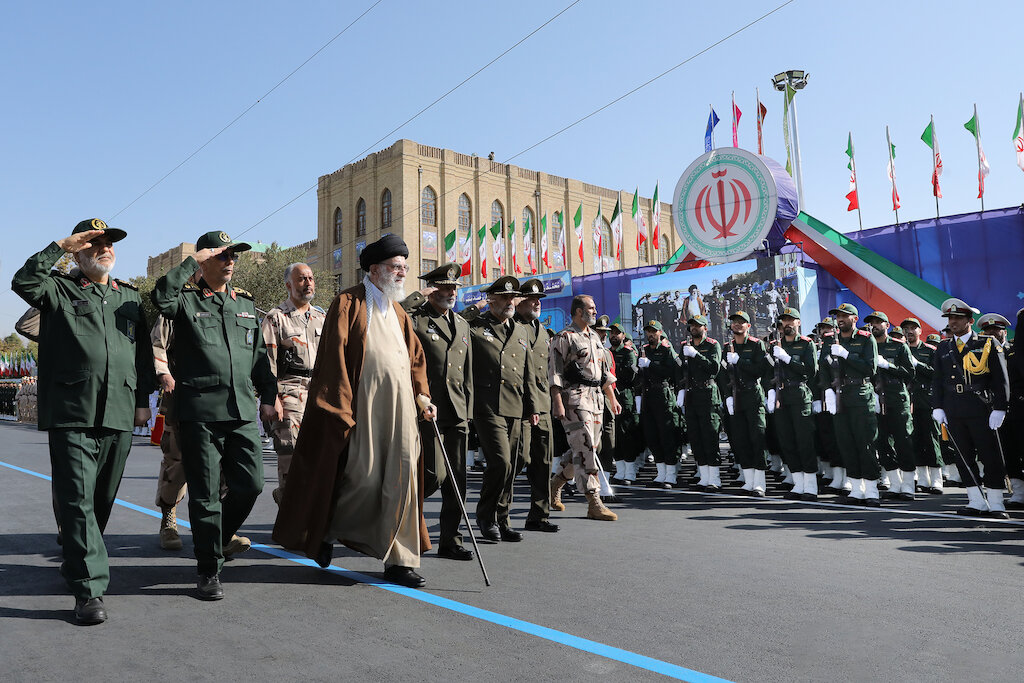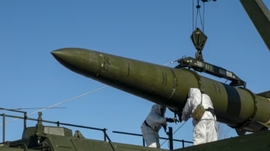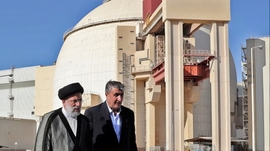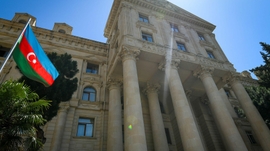Iran's Supreme Leader Ayatollah Ali Khamenei praised the Palestinian militant group Hamas' offensive against Israel as a "devastating earthquake", but dismissed that Tehran was involved in the operation.
“I say that this devastating earthquake has managed to destroy some of the main structures of the oppressive regime’s rule, the reconstruction of which is not easily achievable,” Khamenei said, as reported by the official website of the supreme leader.
Khamenei made the remarks during the graduation ceremony for military cadets in Tehran on October 10.
“We kiss the foreheads and arms of the resourceful and intelligent designers (of the operation) and the Palestinian youth, but those who say that the recent great event is the work of non-Palestinians are making miscalculations,” Khamenei said.
"The supporters of the regime and even some people in the usurping regime have been prating during the last two or three days... saying things like Islamic Iran is behind this move," Khamenei said, adding that "they are wrong, but of course, we defend Palestine and its struggles."
The Iranian leader warned Israeli authorities and their supporters that "committing more crimes" against the Palestinians would lead to "an even bigger misery".
Meanwhile, at a meeting with the participants in the 37th International Islamic Unity Conference on October 3, Khamenei described Israel as a “cancer” that will be eliminated by the Palestinians and the regional resistance forces. He warned the governments seeking to normalize ties with Israel that “they are backing the wrong horse”.
On the morning of October 7, the Izz al-Din al-Qassam brigade, the Hamas military wing, announced the start of the Al-Aqsa Flood operation against Israel.
Thousands of rockets were fired from the Gaza Strip towards Israel, and armed groups entered Israeli settlements. Meanwhile, the Israeli army announced the start of attacks on the Gaza Strip using dozens of fighter jets.
Over 1,000 people were killed in an attack by Hamas on Israel over the weekend, according to the Israeli Embassy in the US. Israeli media also reported the injury of more than 2,600 Israelis.
Meanwhile, according to the Palestinian sources, the death toll from Israeli attacks on the blockaded Gaza Strip reached 770 and about 4,000 were injured.
A day after Hamas incursion, the Lebanese political-military group, Hezbollah, said it fired guided rockets and artillery at multiple areas in Israel. The militant group’s attack has raised questions over the role Iran or Hezbollah played in the incursion.
Since the 1979 Islamic Revolution, Iran and Israel are entangled in a proxy conflict. Tehran reportedly provides military and financial support to Hezbollah, as well as Palestinian organizations like Hamas and Islamic Jihad, which have engaged in conflicts with Israel.
Nathan Sales, a counterterrorism expert at the US State Department, stated in November 2018 that Tehran allocates approximately $100 million annually to fund Hamas and other Palestinian militant groups.
On October 9, Iran's Foreign Ministry Spokesman Nasser Kanani dismissed claims of Iran's involvement in the recent Hamas attack on Israel, suggesting the West and Israel were using such "accusations to justify possible future acts" such as US support for Israel or Israeli "adventurism".
He also warned against threats towards Iran, saying that "any stupid move against Iran will be met with a destructive response".
Also on October 9, Ali Karimi Maqam, a member of Iran's UN mission, rejected a Wall Street Journal report, which said that “Iranian security officials helped plan “Hamas surprise attack on Israel” and “gave the green light for the assault” at a meeting in Beirut on October 2.
An adviser to the supreme leader and former secretary of the Supreme National Security Council, Ali Shamkhani, denied Iran’s support, describing the "Palestinian resistance" as an "independent movement".
US Secretary of State Antony Blinken also commented on these allegations on October 8, saying Iran and Hamas had a "long relationship" but that the US had "not yet seen evidence that Iran directed or was behind this particular attack".
Meanwhile, White House National Security Spokesperson John Kirby said on October 9 that Iran is complicit, even though the US has no intelligence or evidence that points to Tehran’s participation in the attacks on Israel by Hamas.
"Iran has long supported Hamas and other terrorist networks throughout the region with resources capabilities training," he added.
US Senator Lindsey Graham warned, "If there is an escalation in this conflict, if hostages start getting killed, if Hezbollah in the north attacks Israel in strength, we should tell the Ayatollah we will destroy your oil refineries and your oil infrastructure.”







 President Ilham Aliyev announced a significant expansion in Azerbaijan’s gas exports to Europe while addressing a joint press conference with Slova...
President Ilham Aliyev announced a significant expansion in Azerbaijan’s gas exports to Europe while addressing a joint press conference with Slova...
 The Kazakhstan Foreign Ministry has responded to the allegations of domestic violence against one of its diplomats stationed in the United Arab Emi...
The Kazakhstan Foreign Ministry has responded to the allegations of domestic violence against one of its diplomats stationed in the United Arab Emi...
 The modernized and expanded Georgian segment of the Baku-Tbilisi-Kars (BTK) railway is set to recommence freight operations this month.
The modernized and expanded Georgian segment of the Baku-Tbilisi-Kars (BTK) railway is set to recommence freight operations this month.
 Azerbaijan, Uzbekistan, and Kazakhstan are planning to merge their energy systems following a historic memorandum of understanding (MoU) signed by ...
Azerbaijan, Uzbekistan, and Kazakhstan are planning to merge their energy systems following a historic memorandum of understanding (MoU) signed by ...
 Russia is set to conduct military exercises to practice the preparation and deployment for use of tactical nuclear weapons in response to the “prov...
Russia is set to conduct military exercises to practice the preparation and deployment for use of tactical nuclear weapons in response to the “prov...



